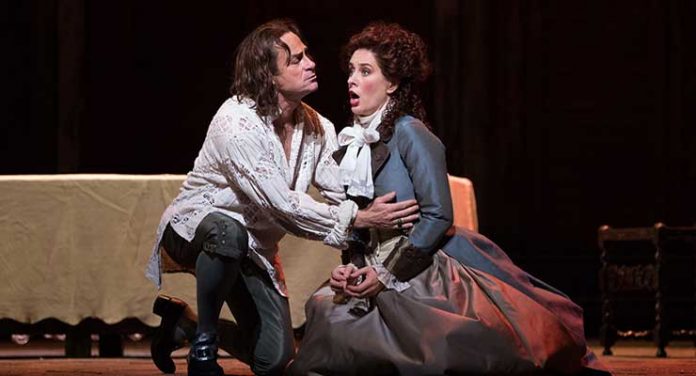For the past decade, Metropolitan Opera General Manager Peter Gelb has brought a sample of the company’s opera season to a worldwide audience via high-definition broadcasts to movie theaters. On October 22, 2016, we were treated to a matinée performance of Mozart’s Don Giovanni that revives Michael Grandage’s 2011 staging. Led by Met Principal Conductor Fabio Luisi, this production featured a principal cast all of whom were making their Metropolitan Opera role debuts: Simon Keenlyside in the title role with Hibla Gerzmava as Donna Anna, Malin Byström as Donna Elvira, Serena Malfi as Zerlina, Paul Appleby as Don Ottavio, Adam Plachetka as Leporello, Matthew Rose as Masetto, and Kwangchul Youn as the Commendatore.
Don Giovanni, although called an “opera buffa,” is easily the darkest and most salacious of the three-opera collaboration between Mozart and his librettist Lorenzo da Ponte. It is also the Met’s most frequently performed Mozart opera for a good reason, as it gives its stars numerous opportunities to shine. The familiar Don Juan story opens with a seduction (Donna Anna) and a murder (her father, the Commendatore), moves swiftly through another attempted seduction (Zerlina), and ends with Don Giovanni’s last supper at which the unrepentant rake is dragged down to the flames of eternal damnation.
[envira-album id=”93479″]
Don Giovanni demands excellent vocal principals, deft pacing from the pit, and strong staging and this 2016 revival scores on two out of three points. I saw this production during its 2011 début and the Met Opera presents us an entirely new cast although not necessarily new to their roles. This group of principals goes from strength to strength. Simon Keenlyside, the dapper English baritone, may have lost some of his vocal sheen, but he appears to have completely recovered from health problems that had kept him out of the Met during the past few seaons. His delivery of the unprincipled Don was a deeper (and more athletic) realization of this complex role than we usually get, and, a few rough patches aside, was vocally quite solid. His youthful male colleagues, baritone Plachetka and bass Rose proved to be good dramatic foils. Plachetka deftly delivered Leporello’s vocal and physical comedy although being much larger than Keenlyside, his Act II impersonation of the Don would fool no one. The burly Rose pulls off a fitting characterization of a country bumpkin who just wants to be with his girl, Zerlina. I have always considered Don Ottavio to be a thankless tenor role but honey-voiced Paul Appleby made this character far more assertive than usual. The three women, sopranos Gerzmava and Byström and mezzo-soprano Malfi formed a terrific trio with contrasting yet most effective vocal styles. Kwangchul Youn contributed his orotund bass-baritone to make the most of the small but important part of Don Giovanni’s doomsayer. Maestro Luisi knows this score like the back of his hand and with the always-stellar Metropolitan Opera Orchestra following his lead, turned in a quite spirited reading, sometimes a bit too spirited in the large vocal ensembles. Thankfully, HD director Benjamin Wright got his camera crew to focus mostly on the cast rather than on British director Michael Grandage’s rather tatty three-story staging. His sets were widely criticized five years ago, and remain the only shortcoming of an otherwise excellent production. Don Giovanni will reappear with different casts in November 2016, April 2017, and May 2017. There will be an “encore” theatrical screening on October 26, 2016. The broadcast dates for the eight remaining operas scheduled for the Met’s “Live in HD” series can be found at the company’s website www.metopera.org.
[fvplayer src=”httpss://www.theaterbyte.com/wordpress/storage/2016/10/2016-17-Don-Giovanni-metopera.mp4″ width=”1920″ height=”1080″ splash=”httpss://www.theaterbyte.com/wordpress/storage/2016/10/16-17-Don-Giovanni-Trailer-L-1.jpg”]
Be the first to leave a review.


